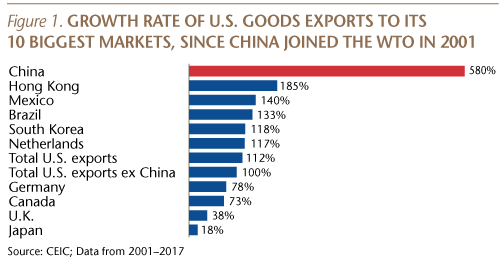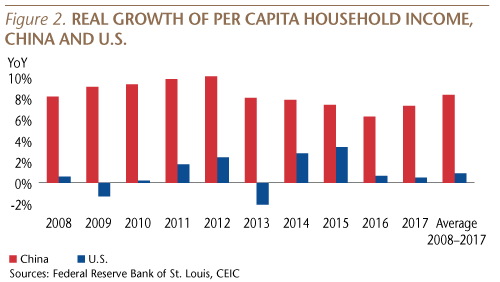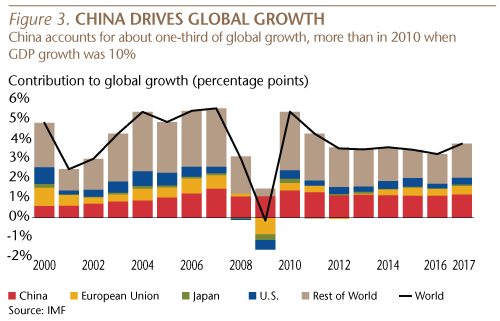Dear Larry Kudlow
Some advice for Trump adviser Larry Kudlow, and key reasons to avoid a trade war with China.
"A trade war with China will inflict serious pain on American workers, farmers and families."
Dear Larry Kudlow,
It looks like you are our last hope for preventing the tariff tantrum with China from escalating into a full-blown trade war.
Larry, a few years ago we had a conversation about China when we both spoke at an investment conference. Following on that, I'd urge you to use your knowledge and access to the president to help him understand the economic and political risks of launching a trade war with our country's largest trading partner.
Given your experience at Bear Stearns and the New York Fed, I'm sure you've spent many hours trying to help President Trump understand that trade is not a zero-sum game, that the deficit is not a scorecard for trade, and that unemployment has actually been lower during periods when our trade deficit has been higher relative to GDP.
But I also understand, from my own government service, how difficult it can be to help a political boss understand complex issues, especially when long-held convictions collide with facts.
So, today I'd like to resume our conversation with some ideas for persuading Trump to redirect his strategy to focus on achieving the world's best trade deal with President Xi Jinping.
Trump's busy schedule means you won't have a lot of time to make your case, so I'd like to help with a summary of the key issues to raise with him.
Our Economy is Strong, We Don’t Need a Trade War
As the president recently tweeted, “The Economy is soooo good, perhaps the best in our country's history. . .” While that isn't entirely accurate, I get the point: business is booming, unemployment is low and the stock market is up. America is great!
I know the president is focused on manufacturing. That too is already great. The Fed's industrial production index fell during the last recession, but recovered to reach an all-time high in November 2014, without new taxes on Chinese imports. The index has continued to edge up.
The manufacturing share of total employment, as you know, peaked back in the 1950s, long before we imported anything from China, as our manufacturers became more efficient. We are making a record amount of stuff with far fewer people. The average American steelworker produced 1,100 tons in 2000, for example, up from 260 tons per worker in 1960.
The manufacturing share of employment also has fallen because as consumers become wealthier, they spend more on services than on goods.
Many American Firms Are Winning in China
China's 2001 inclusion in the World Trade Organization (WTO) has been a boon to many American companies. From then until 2017, U.S. exports to China rose by 580%, while our exports to the rest of the world were up by only 100%. This has opened up opportunities for many publicly listed American companies. General Motors sold more than 4 million vehicles in China last year, marking the sixth consecutive year in which China was a larger retail market than the U.S. for GM. China contributes 18% of Apple's revenue in the third quarter of 2018. Nike shoe sales in China rose 31% YoY during the most recent quarter, and accounted for about 16% of its global shoe revenue. China contributes roughly 15% of global earnings for firms such as Nvidia, Dolby and Tesla.

You've probably read that imports from China led to 2.4 million U.S. job losses. But those jobs were lost over a more than 10-year period. Another study found that U.S. exports to China directly and indirectly supported 1.8 million new jobs in just one year, 2015.
While some American companies are blocked from the Chinese market, many are very profitable there. The American Chamber of Commerce in Shanghai represents 1,500 companies, and their latest member survey found that over three-quarters of U.S. firms in China were profitable last year, the same share as in 2016. Nearly 58% of companies reported higher revenue growth in China than globally.
It is worth noting that the value, in dollar terms, of retail spending in China was equal to 90% of U.S. retail spending last year, up from 27% a decade ago. Within a few years, consumer spending in China will be greater than that in the U.S. We don't want to start a trade war that will lead Beijing to retaliate by shutting American companies out of that market.
A Trade War With China Will Inflict Serious Pain on American Workers, Farmers, Families and Businesses
Trade with China and other countries has helped American families stretch their budgets. The consumer price index for personal computers, for example, declined 96% between 1997 and 2015. Because a tariff on imports is effectively a tax on American consumers who buy those goods, if the administration expands the scope of the tariffs to cover all imports from China, the prices of everything from mobile phones (80% of imports came from China last year) and laptops (93%) to Christmas ornaments (94%) and toys (88%) will rise, probably erasing the impact of the president's tax cut.
Some workers will also suffer. Let's take Boeing as an example. The company is America's largest exporter, and China is its largest market. The company expects China's domestic and international air travel to grow at an average annual rate of 7.6% over the next 20 years. Boeing employs more than 50,000 factory workers and 45,000 engineers across all 50 states, and supports an additional 1.3 million supplier-related jobs in the U.S. Some of those jobs would be at risk if China responds to a trade war by instructing its airlines to buy more from Airbus and less from Boeing.
Apple, which says it is the largest U.S. corporate taxpayer, is another example. Although most of its products undergo final assembly in China, the company said, in a recent letter to the administration, “Every Apple product contains parts or materials from the U.S. and . . . reflects the labor of 2 million U.S. workers across all 50 states.”
China is our largest overseas market for agricultural goods. About one-third of the U.S. soybean crop is sold to China, which could cut its purchases and buy more from Brazil and Argentina. (It is worth noting that 24 Republican members of Congress represent districts that account for about 60% of the total U.S. soybean crop.)
The global supply chain is critical to small firms that manufacture goods in the U.S., and China is a key supplier. A prolonged trade war would accelerate the dispersal of the supply chain from China to other Asian countries, but is very unlikely to result in production and assembly of those goods moving to the U.S. New taxes on those components will instead lead to a mix of lower margins and higher final goods prices in the U.S., as well as layoffs.
China Is Not Trade-Dependent, So a Trade War Is Not Leverage
China's economy is no longer export-driven, so attempting to attack its exports will not inflict much pain.
Net exports (the value of a country's exports minus the value of its imports) account for just 2% of China's GDP, down from a peak of 9% in 2007. In contrast, domestic consumption now accounts for more than two-thirds of China's economic growth and more than half of its GDP.
Last year, Chinese exports to the U.S. accounted for only 19% of total Chinese exports, limiting significantly the impact of new tariffs applied only by the U.S.
And much of the impact of new U.S. import taxes will not be borne by Chinese companies; about two-thirds of the 25 largest exporting companies based in China are foreign-owned.
It is also clear that Xi's government will step in to provide financial aid to companies that are hurt by the Trump tariffs. With fiscal revenue up more than 10% YoY during the first eight months of the year—the fastest growth rate in seven years— Beijing has the resources, as well as the political will, to support its exporters, just as it did a decade ago during the Global Financial Crisis.
As a result, I do not believe a trade war would cause significant damage to the Chinese economy, or provide the Trump administration with significant leverage over Xi's government.
The Chinese Economy Is Healthy
Larry, in August, you stated that the Chinese economy “looks terrible” and “business investment is just collapsing,” suggesting that this puts pressure on Xi to give in to U.S. demands. Unfortunately, your staff has not provided you with an accurate assessment of the Chinese economy.
The Chinese stock market may be weak, with the Shanghai Composite Index down 19% year-to-date through September 14, but earnings growth for larger industrial firms (including many not listed on a stock exchange) remains very healthy. Industrial profits rose 17% YoY during the first seven months of the year, an impressive pace given that earnings rose 21% during the same period last year. Margins are at their highest levels in eight years.
Manufacturing investment, far from collapsing, is up 7.5% this year, compared to 4.5% during the first eight months of 2017.
China is growing more slowly, on a year-over-year basis, as the economy matures and because the base has become very large. Policymakers in Beijing do face significant challenges, such as high debt levels and a weak social safety net. But, the macro numbers remain quite strong. Inflation-adjusted (real) retail sales rose 7.4% during the first eight months of this year in China, compared to a 2.9% growth rate in the U.S. (Online sales of goods in China rose 28%.) Real household income rose 6.6% in China for the first half of 2018, vs. 2.1% in the U.S. Over the last 10 years, real per capita income rose 123% in China, compared to 9% growth in the U.S. We should not start a trade war based on the mistaken belief that we face an economically weak opponent.

In 2017, China accounted for 31% of global economic growth, compared to a 9% share for the U.S. These numbers indicate that a healthy Chinese economy is a good thing for the global economy.

Engagement With China Has Worked, a Trade War Will Not
Larry, possibly the most important point to make to the president is that engagement with China has worked.
Past negotiations with China haven't led to perfect results, but have opened their markets enough that our exports rose by close to 600% since Beijing joined the WTO 16 years ago, while the value of our agricultural shipments jumped by 1,000%.
We even win in the WTO! In a February report to Congress, Kevin Hassett, the chairman of President Trump's Council of Economic Advisors, wrote, “The United States gets better outcomes via formal WTO adjudication than negotiation … the United States has won 85.7% of the cases it has initiated before the WTO since 1995.”
Larry, I hope this letter helps you persuade the president that trade with China has benefited the vast majority of Americans, and that solutions to the challenges our firms continue to face there can be best achieved by a combination of bilateral negotiations and use of the WTO's tools. A trade war would inflict pain on American families, workers, farmers and companies, without forcing Beijing to capitulate to our demands. Larry, we are counting on you to persuade the president to follow a strategy that will keep America great.
Regards,
Andy Rothman
Investment Strategist
Matthews Asia
As of 17 September 2018, accounts managed by Matthews Asia did not hold positions in General Motors Co., The Boeing Company, Nike Inc., Nvidia Corp., Dolby Laboratories Inc., Tesla Inc., Airbus Group or Apple Inc.
